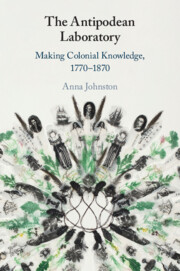Book contents
- The Antipodean Laboratory
- The Antipodean Laboratory
- Copyright page
- Dedication
- Contents
- Figures
- Acknowledgements
- Note on the Text
- Introduction
- Part I Imagining Settler Humanitarianism
- Part II Regulating Settler Society
- Part III Inventing Settler Science
- 5 Collecting Practices
- 6 Creating Colonial Readers and Imperial Networks
- Conclusion
- Bibliography
- Index
Conclusion
Knowing the Colony, Knowing the World
from Part III - Inventing Settler Science
Published online by Cambridge University Press: 21 September 2023
- The Antipodean Laboratory
- The Antipodean Laboratory
- Copyright page
- Dedication
- Contents
- Figures
- Acknowledgements
- Note on the Text
- Introduction
- Part I Imagining Settler Humanitarianism
- Part II Regulating Settler Society
- Part III Inventing Settler Science
- 5 Collecting Practices
- 6 Creating Colonial Readers and Imperial Networks
- Conclusion
- Bibliography
- Index
Summary
The conclusion draws together the threads of the three key fields of colonial knowledge and shows some of the later trajectories of these rich archives. Australian data proved central to key ideas that were fomented during the nineteenth century, and which continue to affect contemporary society. Debates about civilisational orders, and about the role of science and religion in relation to the extension of imperial power and economic privilege, were widespread. The distinctive nature of the Australian colonial experiment continues to make important contributions to global debates about the history of humanitarianism and human rights, apologies and reparations sought by colonised and displaced peoples for the wrongs of imperialism and colonial governance, and the uneven distribution of wealth, up to the twenty-first century.
Keywords
- Type
- Chapter
- Information
- The Antipodean LaboratoryMaking Colonial Knowledge, 1770–1870, pp. 247 - 259Publisher: Cambridge University PressPrint publication year: 2023

